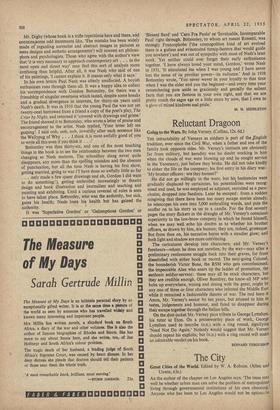Reluctant Dragoon
Going to the Wars. By John Verney. (Collins, 12s. 6d.) THE intractability of Verneys as soldiers is part of the English tradition, ever since the Civil War, when a father and son of the family took opposite sides. Mr. Verney's instincts are obviously far from military, but heredity was no doubt working in him when the clouds of war were blowing up and he sought service in the Yeomanry, just before they broke. He did not take kindly to either the life or the company; his first entry in his diary was: 'My brother officers : are they human?'
He did not go willingly to the wars; but his hesitancies were
gradually displaced by certainties, his potentialities were recog- nised and used, he was employed as adjutant, recruited as a para- chutist, dropped into Sardinia. Later he escaped : from a sudden misgiving that there have been too many escape stories already, he telescopes his own into 5,000 enthralling words, and puts the snuffer on to his story as on to a candle. For the first seventy pages the story flickers in the draught of Mr. Verney's conscious superiority to the lowbrow company in which he found himself, when we may well echo his doubts as to whether his brother officers, as drawn by him, are human; they are, indeed, grotesque. But from then on, his narrative burns with a steadier glow; and both light and shadow are more convincing.
The caricatures develop into characters; and Mr. Verney's forebears—whom he does not mention, by the way—may after a preliminary restlessness snuggle back into their graves, far from dissatisfied with either book or record. The easy-going Colonel, the bounderish Victor Bone, the RSM who gets commissioned, the impeccable Alan who soars up the ladder of promotion, the sardonic soldier-servant : these may all be stock characters, but they are credible enough. Oliver Bomfrey, the know-all MP who bobs up everywhere, wining and dining with the great, might be any one of three or four characters who infested the Middle East while it remained a fashionable theatre of war. The real hero is Amos, Mr. Verney's senior by ten years, but attuned to him in tastes, judgements and humour, and fated to disappear during their escape together through the Italian hills.
On the dust-jacket Mr. Verney pays tribute to George Lyttelton, his tutor at Eton. On a praiseworthy piece of work, George Lyttelton used to inscribe (n.n.) with a ring round, signifying 'Need Not Do Again.' Nobody would suggest that Mr. Verney should repeat his exploits; but (n.n.) with a ring round will make an admirable verdict on his book.
BERNARD FERGUSSON










































 Previous page
Previous page